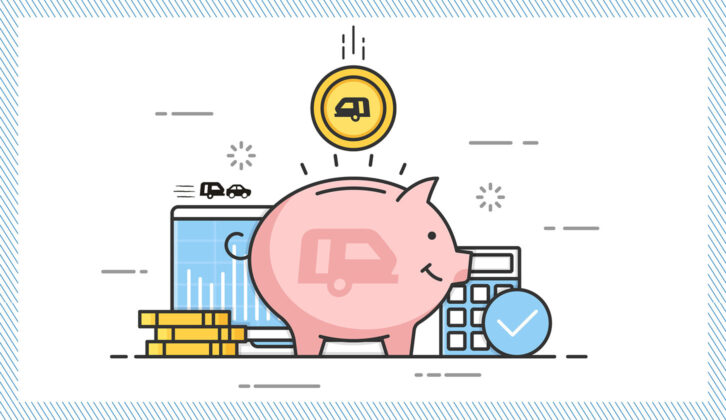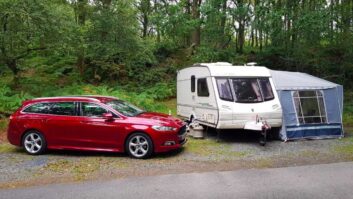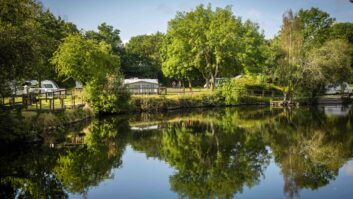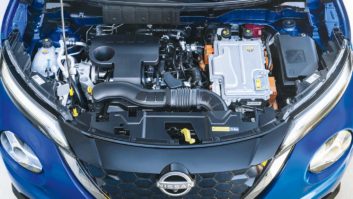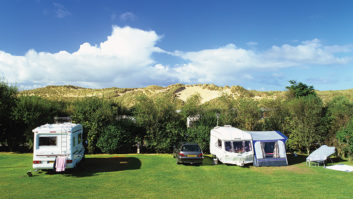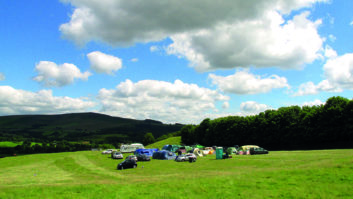Despite a backdrop of ever-rising energy bills and the cost of living crisis, you can still find ways to enjoy caravanning on a budget.
And if you haven’t yet bought your outfit, it’s still possible to bag a bargain – all you need to do is be a savvy shopper. Here are our favourite tips for getting the best value out of your touring life.
Bag a bargain caravan
Buying one of the best used caravans can be a great way to enter the world of touring at a more budget-friendly price.
After all, with supply chain issues due to wars, pandemics, Brexit, energy costs, a weak pound and silicon chip shortages (take your pick), the new-caravan market has never been more erratic. However, this has also had the knock-on effect of causing prices in the used market to go up – and they’re likely to stay that way for some time to come.
Although it is safest to buy from a caravan dealer, many are short of stock and struggling to keep up with demand these days. So prices are high and on the used market, stock is in short supply.
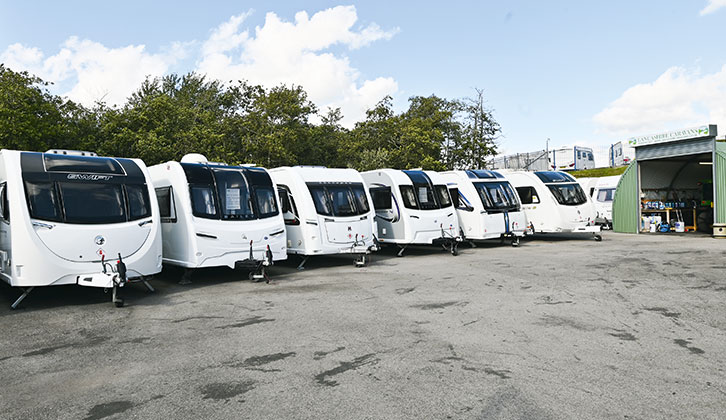
Vans that stick on the forecourts are often those with a quirky caravan layout that are less popular. That’s not to say you won’t find a bargain, new or used, at a dealer, but you’ll need to look a bit harder – or be prepared to compromise a little on the floorplan that you prefer.
There are still bargains to be had in private sales, but you do need to be far more cautious and ideally, take along a knowledgeable friend when you view.
You can also pay to have the caravan independently inspected, something that is well worth doing.
The golden rule is never to hand over any money before you’ve physically seen the caravan in question. And if you can, check the private buyer’s background (for example, are they actually traders, selling off their driveway?).
In addition, it’s important to ensure that you see all of the caravan’s relevant documents – is it properly paid for, or are outstanding loans attached to it? Worse still, has it been stolen?
For complete peace of mind, a CRiS check will provide a comprehensive history relating to any pre-owned tourer – our guide to CRiS registration explains more about the scheme.
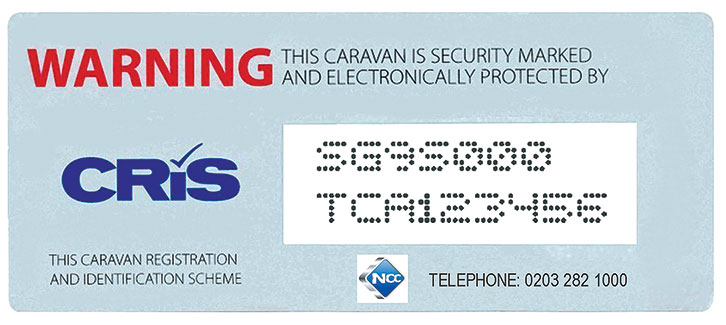
A top tip from the police is to ask to see photos of the caravan on the private seller’s phone. Paperwork can be forged, but a lack of holiday photos with the caravan in view is a big red flag.
Any deal where the seller is trying to get your money up front (for example, ‘to hold the caravan as there’s been so much interest’), or anything where you feel under pressure and fear missing out on a bargain, is a classic selling tactic to part you from your cash. Don’t fall for it.
If you’re buying a caravan via social media, make sure you see it in person and never part with any money until you’re standing in front of it. Fake listings are rife on such platforms. Scam sellers are pretty smart these days and often simply lift photos and text for genuine tourers, then price them carefully. If they were half price, they’d be easy to spot, but they are often just a bit cheaper than normal, to make the listing seem believable.
Scare stories and warnings aside, you can still find bargains online and the savings can be immense. Our guide to buying a used caravan is full of useful guidance to make sure you find the tourer that’s right for you.
Get the best economy
You’ve got the tourer sorted – it’s now time to think about the best car for towing a caravan. One factor in any outfit’s economy is its air resistance and frontal area. If you’re at the buying stage and you want to maximise this, pick the most aerodynamic caravan you can find.
However, your driving style is the most important contributor. Your car’s engine size is less crucial, but diesel will be more frugal than petrol – we recently took a look at why diesel is still the best – for now.
Drive everywhere fully laden with your foot to the floor and you can expect dire consumption. Drive gently and remove as much kit as you can to get the best mpg.
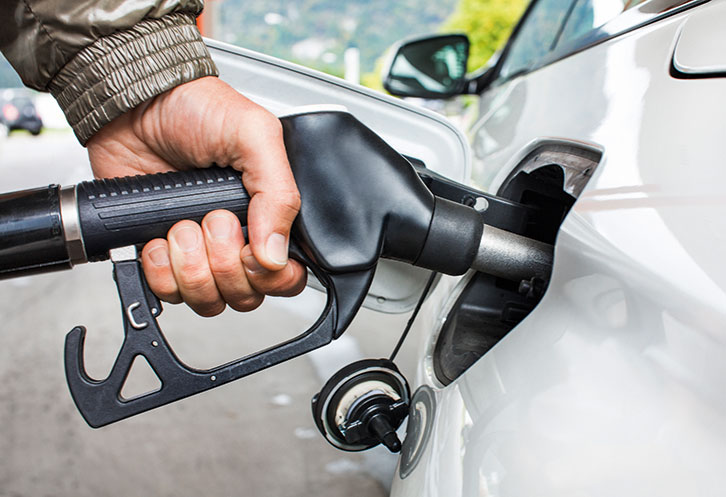
Next, make sure both your tow car and your caravan are in peak condition before you set off. As a minimum, carry out some pre-tour checks, including checking the oil levels, screen wash and tyre pressures (don’t forget the spares) on your car and van, and replace low gas bottles.
“How does this save me money?” we hear you ask. Well, setting the right tyre pressures won’t just make your car and caravan safer, it will also reduce the fuel consumption on your journey.
And by making sure you have plenty of gas before you leave, there’s less chance of having to dash to your nearest caravan dealer or outdoor store to buy more, eating into your holiday time and burning more diesel or petrol while you travel about.
Parts prices
Once your tow car is out of warranty, you don’t necessarily have to use main dealer parts. The parts and servicing departments of the majority of main dealerships are often the most profitable areas of their business, and you can save an absolute fortune by buying original manufacturer-quality parts from an alternative supplier. Actually, in some cases, you can even buy parts that are better than the originals.
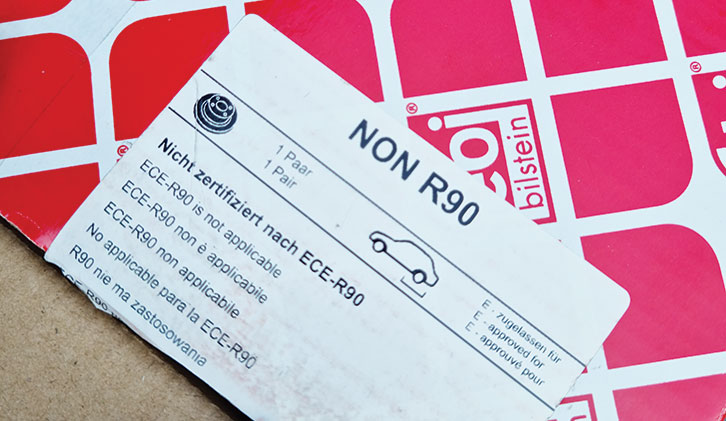
Shopping around for parts, websites to use include Euro Car Parts, GSF Car Parts, Autodoc or your local motor factor.
Always obtain four parts prices before committing to anything – main dealer, local motor factor, online retailer (such as Euro Car Parts) and Autodoc. Often, your local motor factor will match the cheapest online price and will usually happily swap parts if they’re incorrect. It’s worth developing a relationship with your local firm for this reason.
Tyre costs
When you are looking at replacing your tyres, don’t just drive to your local garage or main dealer and get them to provide tyres for your tow car or caravan.
They are rarely the cheapest suppliers and will often have a limited choice or a high mark-up. Or both! Much better deals are to be found online, from firms such as Camskill, Black Circles or Halfords. It really does pay to shop around.
However, you should also remember to factor in the delivery cost, because this varies (although it’s not as expensive as you might think – £13.50 was the cheapest delivery we found for four tyres).
Online retailers can offer a much wider choice of tyres and will supply direct to your local tyre centre, or provide a mobile technician to fit them on your drive.
The cost of fitting is similar, either way, so we would always recommend having them fitted on your drive – then there’s no wearisome sitting around for ages in an uncomfortable waiting room!
Tyres that are half the price of premium brands might seem like a real bargain, but they will generally perform less well over their (shorter) lifespan, with reduced grip in the rain, longer braking distances and faster wear. If the tyres wear out twice as quickly, but cost two-thirds of the price of a premium tyre, you’re simply throwing money away, and reducing your safety at the same time.
Major brands, such as Michelin and Continental, carefully construct their tyres with different compounds across the whole tread width, to produce a very sophisticated piece of engineering, while cheaply made ‘budget’ tyres rarely last as well and never feel pleasant to drive on. Skimp on anything but your tyres.
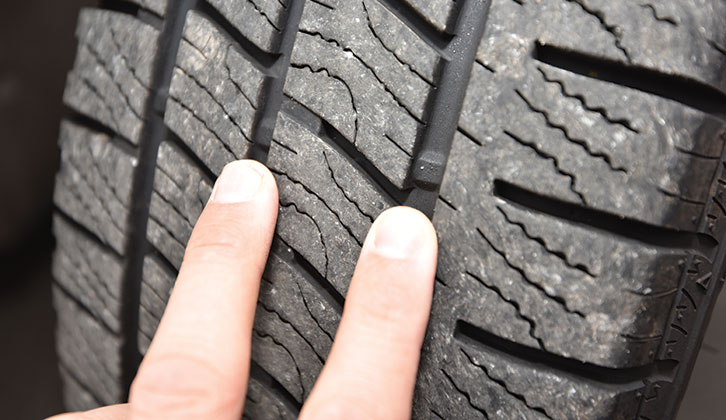
If you have four or more tyres to replace and your wheels are also looking a little scuffed and in need of refurbishment, a good tip is to have your wheels refurbished at the same time as you get the tyres put on. This typically costs from £40 to £80 a wheel (shop around for the best price) and the crucial thing here is that the work often includes free tyre fitting and balancing. So if you give the wheel refurb firm your new tyres, in effect you’ll be getting them fitted and balanced, too, and all for free.
It’s also worth noting that tyres are live priced – that is, their cost is continually fluctuating, so it pays to shop around for a few weeks before you’re due to buy a set, to try and get the best possible price.
Insurance
A good percentage of people will simply stick with the same insurance provider every year to cover their towing vehicle, and sometimes their caravan, too. Of course, caravan insurance isn’t a legal obligation, but we would always recommend having it.
Staying with the same insurer isn’t usually the wisest move if you want to save cash, and it often pays to be disloyal. Swapping insurance used to be a fairly long-winded affair, but these days it’s a half-hour phone call and all far less complicated.
For your caravan, we’d recommend going through a specialist insurer that deals with leisure vehicles, because they tend to provide the correct levels of cover needed for a tourer.
To reduce your premium on your car, have at least one person aged over 50 as a named driver and always ensure that you have suitable security systems fitted to your tow car and caravan.
If breakdown cover is included as part of your policy, that’s a good thing – it can save you quite a bit compared with a standalone policy. Make sure it fully covers the length, weight and height of your caravan, however – not all breakdown companies will.
Take a look at our guide to caravan breakdown cover to find out more.
Pitching up
Choosing the best caravan park always puts you on your way to having a great holiday. It goes without saying, you should always shop around for the cheapest pitch fee, but if you’re dead set on going to a certain campsite, there’s little you can do to reduce the pitch fee, other than staying out of season or not having an electric hook-up.
However, one way you can save money is to stay on Camping and Caravanning Club CSs, or Caravan and Motorhome Club CLs. These small, five-pitch sites, which tend to be quiet and minimal, are often found in rural locations such as farms, and can be a far cheaper alternative to the larger mainstream campsites.
Facilities will vary – for example, not all will have a toilet block – but there are some real gems in the network, and at bargain-basement prices. Always book by phone – not all will have a website – and make sure you ask about the firmness of the ground and the access if you have a particularly large caravan.
Filling the fridge
If you don’t have a Lidl or an Aldi near you, it really pays to shop around in the area and pick the cheapest supermarket that’s close to where you live – look for the bargain brands, especially on staples such as bread and milk.
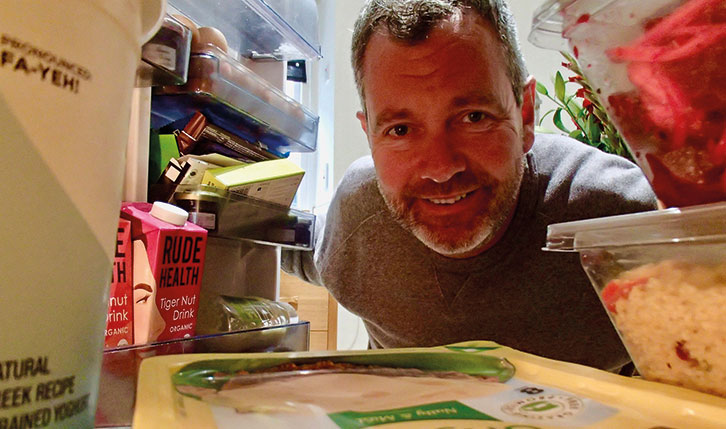
The other alternative – which can save you a little fuel – is to buy your supplies on the road (perhaps when you pass a discount store, if you can find room to stop), or when you get to the site.
Where possible, go for local produce that hasn’t travelled many miles. Shopping this way will not only save you fuel, but will also help the local economy around the site, so it’s the green thing to do.
- Are you looking for some ideas for what you should be packing for your tours? Our caravan essentials guide is sure to help!
Written with contributions from Peter Rosenthal, David Motton and Andrew Jenkinson
If you’ve enjoyed reading this article, why not get the latest news, reviews and features delivered direct to your door or inbox every month. Take advantage of our brilliant Practical Caravan magazine SUBSCRIBERS’ OFFER and SIGN UP TO OUR NEWSLETTER for regular weekly updates on all things caravan related.
